-
WalletHub reports on best car insurance companies in Missouri
UMKC Professor Larry Wigger answers insurance questions. Read more.
Sep 20, 2021
-
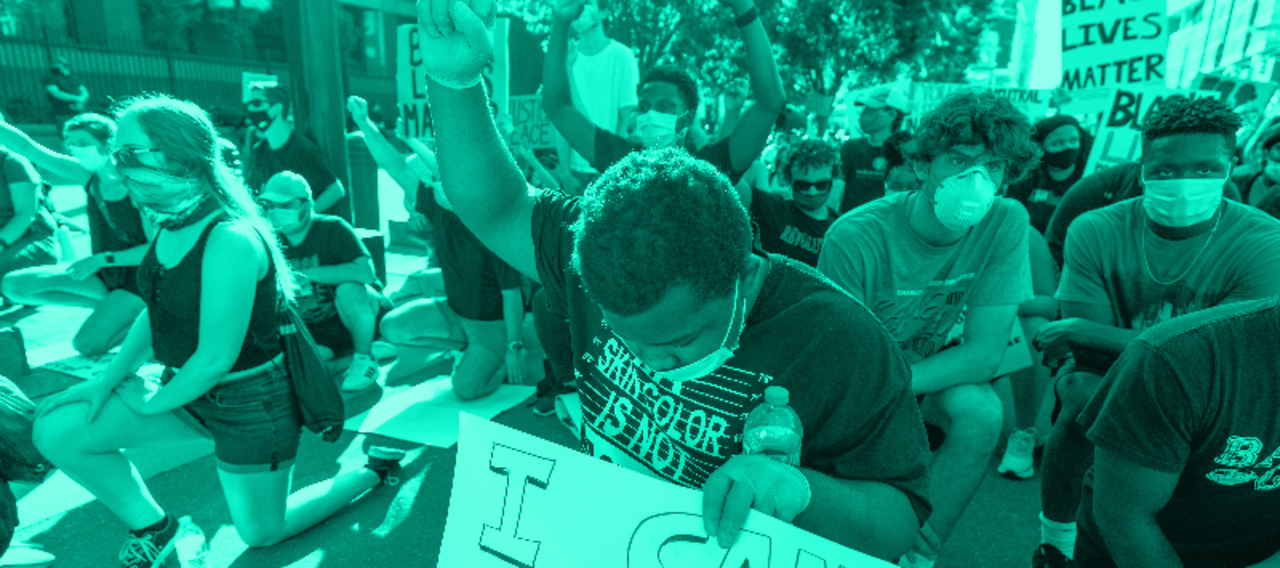
The Division of Diversity and Inclusion will continue to host a series addressing systemic racism in the U.S.
The Critical Conversations series will continue this year.
The series is part of the thoughtful action our community is taking to ensure lasting and comprehensive reform through Roos Advocate for Community Change, a campus-wide effort announced in June 2020 following the death of George Floyd.
Last year’s panel discussions were in a Zoom town hall format and featured UMKC faculty, staff, students and volunteer leaders who represent the topic being discussed. Due to the ongoing pandemic, the sessions will remain virtual until further notice.
Each discussion aims to enlighten, educate, and explore the causes and potential cures for racism. Further, the university will strive to share actionable steps that can be used to improve racial interactions in the broader community. For more information, please email umkcchancellor@umkc.edu.
Upcoming Session:
The next session of Critical Conversations has not yet been announced. Check back here for the latest updates on the series.
Critical Conversations Series:
Tenth Session, Nov. 16: COVID, Vaccinations and (Mis)Information in Communities of Color
Panelists included: Qiana Thomason, President and CEO of Health Forward Foundation; Dr. Liset Olarte, Divison of Infectious Disease at Children's Mercy Hospital Kansas City; Jannette Berkely-Patton, professor at UMKC Biomedical/Health Informatics and Frank Thompson, interim Director of Health at the Kansas City Health Department. Gary O'Bannon, executive in-house residence, UMKC Henry W. Bloch School of Management, was the moderator.
Ninth Session, Sept. 9: The Role of Antiracism Work and Healing in Museums
Panelists included: Rashida Phillips, executive director, American Jazz Museum; Julian Zugazahoitia, director and CEO, The Nelson-Atkins Museum of Art; Glenn North, executive director, Bruce R. Watkins Cultural Heritage Center; Matthew Naylor, president and CEO, National World War 1 Museum and Memorial; and Anna Marie Tutera, director, Kansas City Museum. Gary O'Bannon, executive-in-resident, UMKC Henry W. Bloch School of Management, was the moderator.
Critical Conversations from 2020-21:
To see a complete list of the first eight sessions, click here.
Aug 31, 2021
-
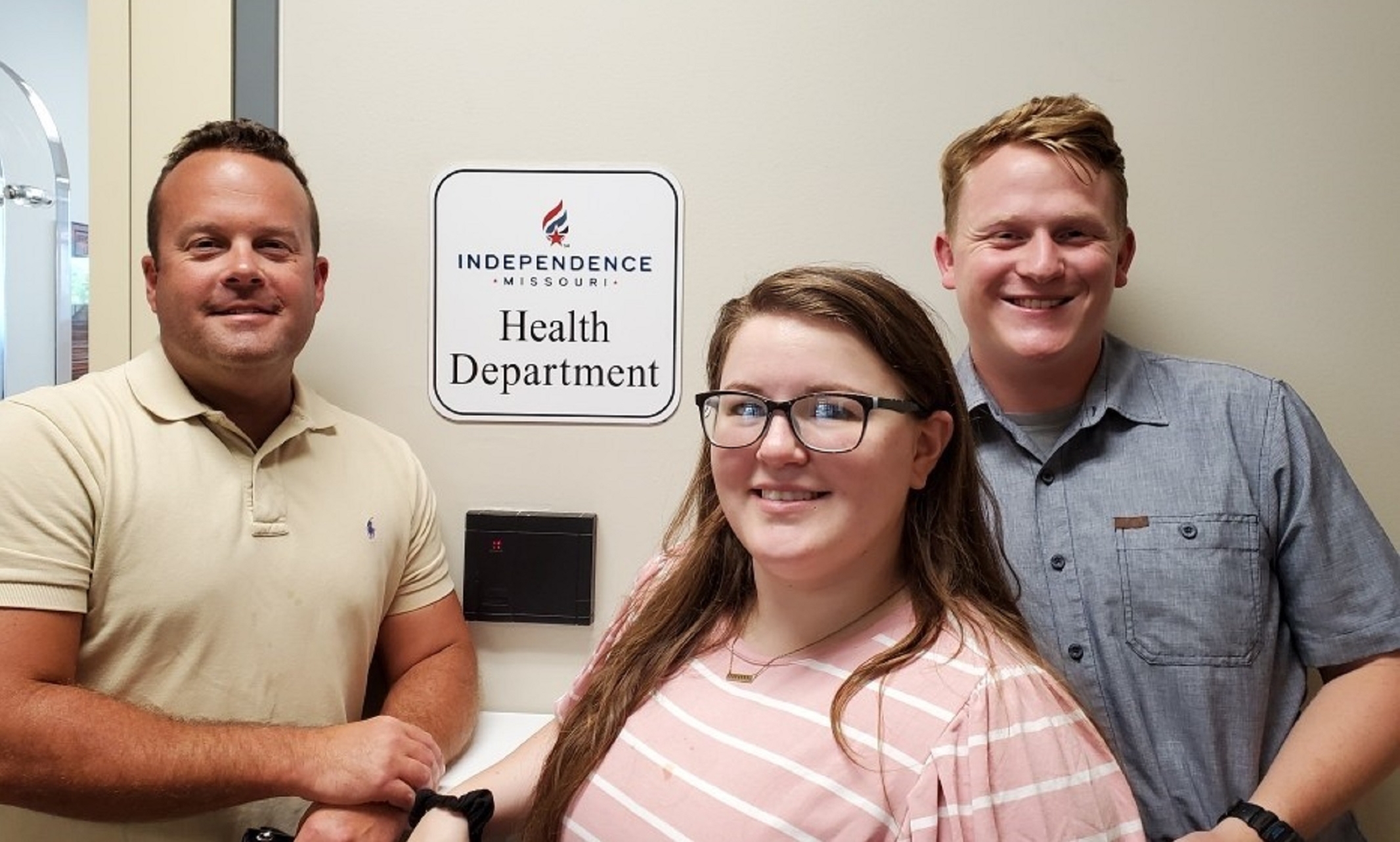
City of Independence, UMKC help each other as importance of community programs grows
When the city of Independence, Missouri, wanted to re-institute its Health Department, two recent graduates of the School of Nursing and Health Studies — and an adjunct professor — were there to help.
The process showed the value of the university to its government and community partners, and it gave the graduates full-time jobs in their field of public health.
Halie Smith-Griffin, who graduated magna cum laude from the public health program, began helping Independence restore its Health Department during her senior year as her capstone project. And when the city had an opening for a public health specialist, she was a natural for the job.
“I chose public health because I wanted to explore more upstream methods to improve the public’s health rather than focusing my efforts on them once they already made it to the hospital,” said Smith-Griffin, an Independence native. “I’m re-establishing community-based programs since the Health Department just re-opened a few months ago after being shut down for a few years.”
Another public health graduate, Conner Berens, is from nearby Lee’s Summit and was a familiar face around Independence government. “I have volunteered for the City of Independence Office of Emergency Preparedness since I was a sophomore in high school,” he said. So when there was an opening for a public health response planner, he jumped at the chance.
Berens had hoped to find a job relating to public health or emergency management right out of school, and he said UMKC prepared him to do just that.
“The public health program put me into the real world, teaching me the principles of research, how to deal with the unexpected, how to develop a health program, and how to be a kind, effective and professional public health practitioner.”
Besides their passion for public health and the lessons and experiences gained at UMKC, Smith-Griffin and Berens graduated at an opportune time, when Independence was re-establishing its Health Department.
In 2018, Independence chose to stop some department functions that were duplicated by Jackson County, such as those related to vital records and vaccinations, and shifted other functions to different city departments. But with the onset of the pandemic, it made sense for the city of around 125,000 residents to have its own Health Department again.
One longtime city administrator tasked with reinstituting the department, Mike Jackson, is an adjunct faculty member with UMKC’s public health program. Jackson has worked for the city about 20 years, holding various posts in environmental health and public works. “So I know about various funding sources, and what the Health Department looked like before and how its functions were reorganized,” he said.
Jackson also knew UMKC could be a great resource. “Around 2014 when the nursing school was putting its public health program together, I was asked to design the environmental health course. And then I was asked to teach it,” he said. “For a project in my class, Conner interned with our emergency preparedness and fire department.”
Jackson also told Smith-Griffin, whose senior project he had supervised, about the job opening she eventually filled. “But then I got out of the away, removed myself from the hiring process,” Jackson said. “It was her turn to shine, and I didn’t want anyone thinking she didn’t deserve the job.”
The re-established Health Department was officially recognized by the state late last year, and Jackson, Smith-Griffin and Berens are busy getting all its functions coordinated and running again.
“I am working on two grants right now,” said Smith-Griffin, who has a small child and great interest in child and maternal health. “One is focused on maternal child health and the other is focused specifically on child health.”
The Technology, Marketing and Media in Health course, taught by Assistant Professor Dipti Subramaniam, Ph.D., is helping Smith-Griffin create promotional material for the maternal health grant. And she said her Health Program Management class, taught by Assistant Professor Matthew Chrisman, Ph.D., has helped her set up her grants.
“I have had to find out who my target population is for my grant, a significant problem they have, and an intervention that could improve their health,” Smith-Griffin said. “I have had to write SMART goals and objectives,” SMART standing for Specific, Measurable, Assignable (or Achievable or Attainable), Realistic (or Relevant) and Time-related (or Time-bound).
Berens is working with COVID-19 surveillance and epidemiology, and with updating emergency response plans.
“Future tasks include developing plans and partnerships to prepare for public health disasters such as environmental crises, natural disasters, disease outbreaks, bioterrorism and other events that result in a mass medical surge or immediate threat to public health,” he said.
During school, Berens also volunteered for the Medical Reserve Corps of Kansas City in response to COVID-19. He said volunteering was a great supplement to his coursework, and he encourages current students to sign up for medical and non-medical opportunities at https://www.mrckc.org.
For his part, Jackson has been busy restarting Health Department functions that had reverted to the county, such as vaccine clinics and disease tracking and tracing, and reintegrating other functions that the city retained, such as restaurant health inspections.
“I know a student can’t always parlay volunteering or an internship into a fulltime job,” Jackson said, “but Conner and Halie showed us what they could do and really shined. That reflects well on them and on UMKC.”
Aug 30, 2021
-
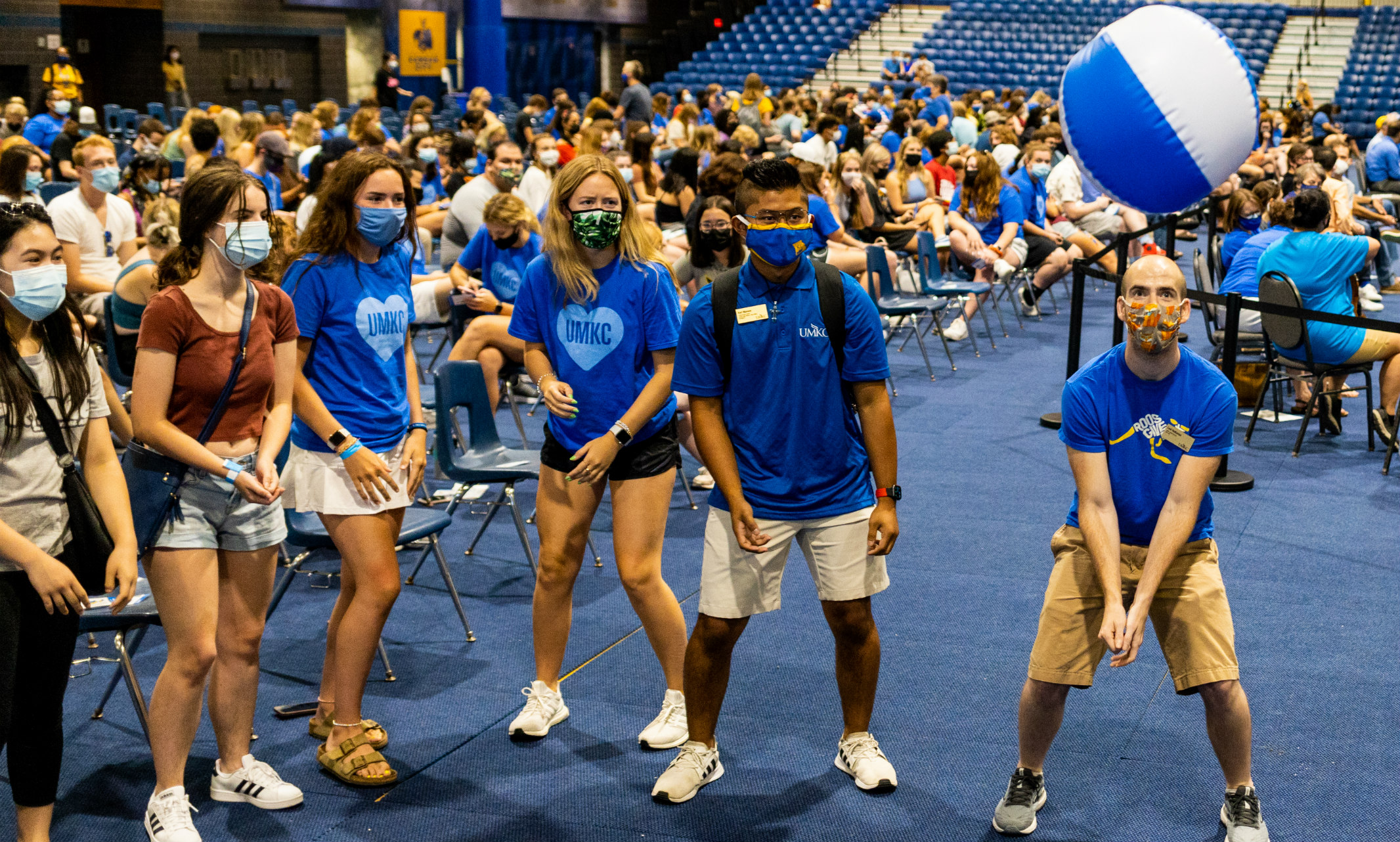
UMKC students kick off Fall 2021 semester
It started with moving in to a new campus or off-campus home. It ended with an upbeat ceremony introducing traditions and an official launch of college life. Also in the mix were meetups, brunches, impromptu introductions and organized frivolity, dancing, a pool party, a mechanical bull, soccer with pregame tailgate party and more.
Roo Welcome is the annual rite of passage for new students at UMKC. It involves informal academic preparations, sessions on managing finances, men’s and women’s soccer games and plenty of fun activities. In concludes with Convocation, where new students are welcomed by the Chancellor and Provost, learn the alma mater and fight song and put on their UMKC pins.
Here’s a look at scenes from Roo Welcome 2021.
It takes a cartload to turn a Residence Hall room into a home
Gotta have that favorite pillow
The journey begins with a single step
Summer scene at Scofield Hall
Welcome to Convocation
Pre-Convocation games
Summer sunshine on the quad
KC Roo demonstrating leadership
A tailgate feast
Game time!
Attention to detail matters
Catch a wave
Headed to the Student Union . . .
. . . for a caffeine break
Our newest campus icon, the bronze Roo by sculptor Tom Corbin
Late Night with the Greeks drew a nighttime crowd
Letting the music move you
Can he hold on?
Sunset over the soccer field
Aug 27, 2021
-
Rebecca Best offers expertise to media
Rebecca Best, an associate professor of political science at the University of Missouri-Kansas City, said ISIS-K stands to undermine the Taliban and the United States with its attack.
What Is ISIS-K? A Look at the Group Responsible for Afghanistan Terror Attack - KMIZ
The Revolt of Islamic State-Khorasan - Political Violence at a Glance
Aug 27, 2021
-
Kansas City Star taps Greg Vonnahme for article about Rep. Emanuel Cleaver
Greg Vonnahme, a political science professor at the University of Missouri-Kansas City, was interviewed for this story. Read more. (subscription required)
Aug 27, 2021
-
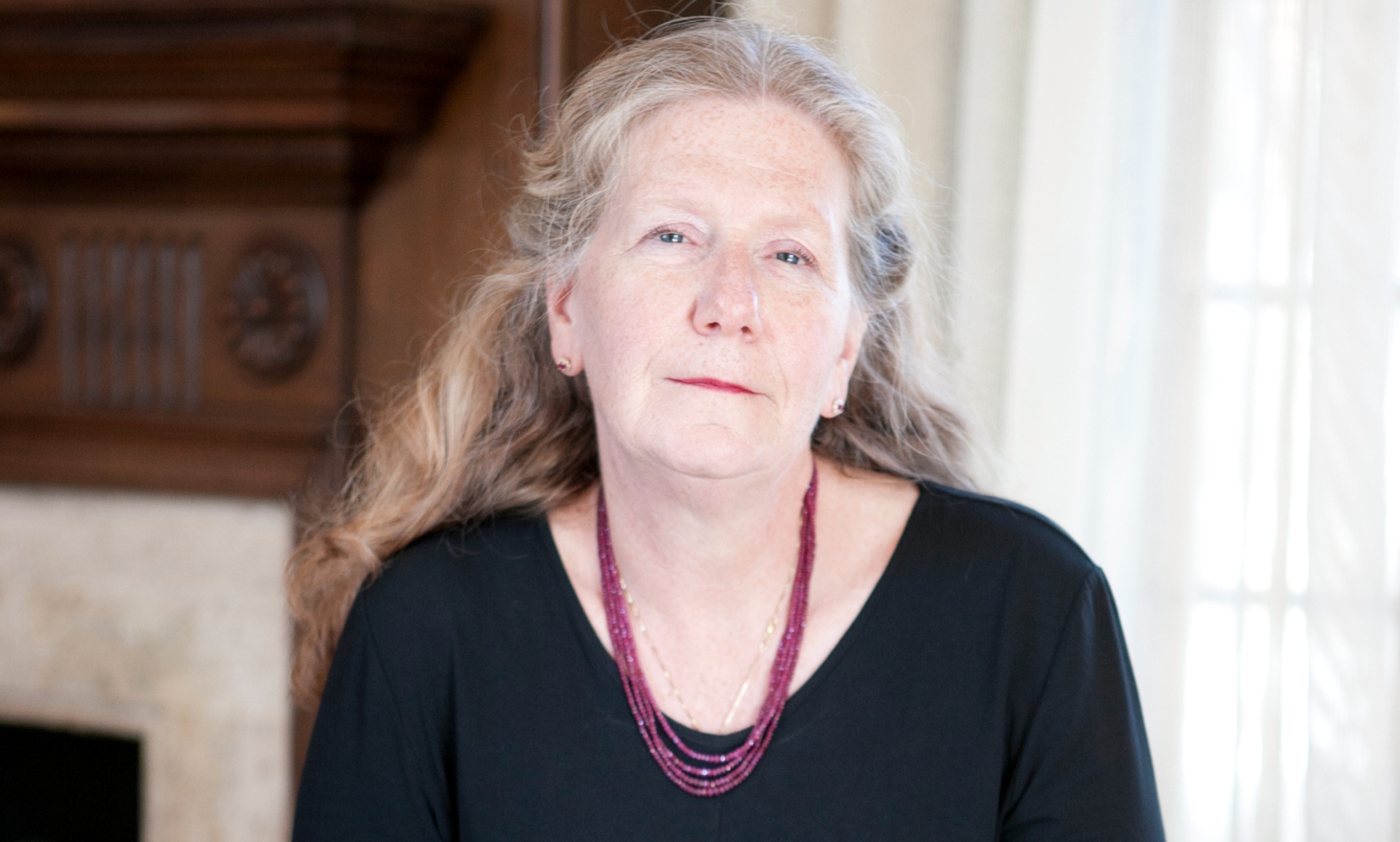
2011 Alumna of the Year Cynthia Watson wraps up career at National War College
Cynthia Watson (B.A. ’78), the UMKC 2011 Alumna of the Year, has announced her pending retirement after three decades of service at the National War College, where she served as a professor of National Security Strategy, chair of the Department of Security Studies and then dean of Faculty and Academic Programs.
As a world-renowned authority on security policy analysis, Watson has directly impacted U.S. foreign policy in everything from civilian-military relations to national security issues. Her students, according to the college, have been “future leaders of the Armed Forces, Department of State and other civilian agencies” being groomed for high-level policy, command and staff responsibilities.
As she prepares for retirement in December, Watson corresponded with her alma mater by email to share reflections on her career and thoughts on current affairs:
Looking back over your career as an educator and scholar, what would you consider to be the highlights and/or most significant accomplishments?
I am proud to show that a UMKC education offered me the privilege of working and studying contemporary issues in several settings around the country. I am especially proud of my three and a half years as Dean of Faculty and Academic Programs, out of 29 overall years, at the National War College where we bring together such a diverse array of students who tackle extraordinarily important yet often intractable problems for the U.S. and our partner nations. I will continue this as Interim Provost of the National Defense University until December 2021.
In your view, what is the most significant national security challenge the U.S. must address?
We must address our internal divisions in my personal analysis. People overseas no longer see us as a beacon on the hill. Compromise is NOT a dirty word but is what made us uniquely successful for two hundred years. By no longer doing that, we are allowing our adversaries to rip us apart which will prevent us from sustaining the power of this nation in many ways.
What are your favorite memories of your days as a UMKC undergraduate?
I have such fond memories of friends who I lost track of over the decades but with whom I have connected on social media. They are awesome people who have gone out to do such marvelous things across the country and in their fields.
Aug 26, 2021
-
Diane Mutti-Burke weighs-in
Diane Mutti-Burke, a professor of history at the University of Missouri-Kansas City, was interviewed by local media about the re-naming of the creek. Read the news coverage:
Controversial Name, History of Johnson County Creek Leads To Possible Name Change - KSHB
“Negro Creek” In Johnson County Likely Renamed After Finding Link To Racial Violence - KCTV5
Aug 26, 2021
-
Our Healthy KC Eastside interviews Dina Newman
Dina Newman, director of the UMKC Center for Neighborhoods, discusses the organization's role in Our Healthy KC Eastside, a large-scale, community-based partnership addressing vaccine hesitance and health inequities in vulnerable portions of Jackson County, Mo. Read the full article.
Aug 25, 2021
-
Kansas City Media Reports on Roo Blue Swirl
Betty Rae’s Ice Cream is now scooping “Roo Blue Swirl” in homage to the University of Missouri-Kansas City. Owner Alec Rodgers is a UMKC alum, and said the new mix was a collaborative effort with the university. Read the news coverage:
Betty Rae’s Debuts New UMKC-inspired Flavor, ‘Roo Blue Swirl’ - KSHB
Iconic KC Ice Cream Shop Debuts New Flavor In Honor of Local University - KCTV5
Aug 25, 2021
-
The Pitch profiles Steve Kraske
Steve Kraske is a professor in the UMKC College of Arts and Sciences. He is also the host of KCUR's Up to Date. Read the article.
Aug 25, 2021
-
KC Applauds shares performance details with UMKC Theatre students
Mobile Molièr: UMKC Theatre’s MFA actors bring their riotous romp of a touring show to local schools, performing some of Molière’s most famous and hilarious scenes. Read more.
Aug 25, 2021
-
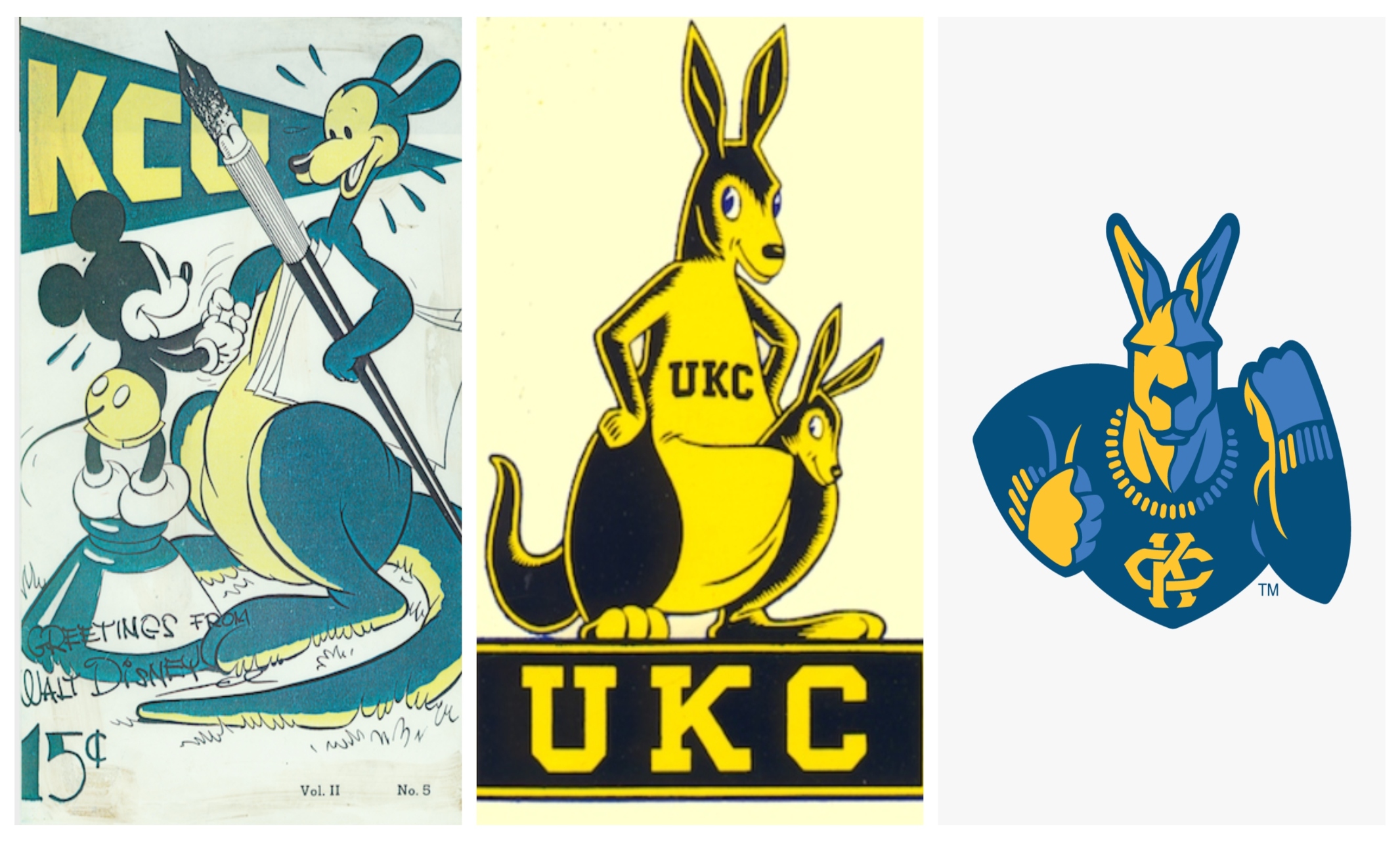
A hop back through time for a look at the mascot’s changing style
In 1936, students at the newly established University of Kansas City were looking for a mascot that would embody the spirit of their school.
The three-year-old university had yet to establish an athletics program, but the debate team was about to begin competing with other universities.
“So, this idea came about that we needed to have a mascot for the university,” said Chris Wolff, the manager of the UMKC Bookstore and a UMKC historian.
At the time, the city of Kansas City was abuzz, eagerly anticipating some very exciting news. Across town at the Kansas City Zoo, Jigger the kangaroo, who had arrived just one year before, was pregnant and the whole town was awaiting news of her little one’s arrival. With all the excitement of the joey’s debut, the students were inspired and chose the kangaroo as the new mascot of the debate team. After all, it rhymed with KCU, the colloquial term used by the community for the university, and they knew the unique selection would stand out.
At first, the adoption of the kangaroo mascot was a student-led effort. After the debate team signed on, the yearbook did too, using the kangaroo as part of the front cover. The kangaroo mascot was nearly lost forever though, when in 1937 the yearbook dropped the kangaroo as its mascot. Not everyone was happy about the change. John Chaney, the president of the KCU Student Council, started the Kangaroo Party of the University of Kansas City with the platform to adopt the kangaroo as the university’s official mascot. In the fall of 1937, Kasey Kangaroo was born.
Throughout the years, Kasey has taken on many forms, both from student-created depictions, to official university marketing. Here is a look back at some of the most recognizable iterations.
The Disney Roo - 1938
In the early years of the kangaroo mascot, the depiction of the mascot was left to students, with help from a local celebrity. Fresh off his 1937 hit Snow White, KC native and famous animator Walt Disney responded to a request from KCU students to illustrate the cover of the March 1938 edition of the student-published humor magazine, The Kangaroo. Nearly a century later, it’s still perhaps the most well-known version of the KC Roo.
Student Roos 1938 - 1968
Over the next couple of decades, students created their own version of KC Roo for various purposes. Some were based on Disney’s version, others were completely unique creations.
The First Official Kasey - 1963
For more than 25 years after the kangaroo became the official KCU mascot, KCU did not use a depiction of a Roo in an official capacity. That changed shortly before KCU joined the University of Missouri System and became the University of Missouri–Kansas City, when the university unveiled its first Roo. It was also the first time Kasey is depicted with a pouch, making her a female. When the university merged with the Missouri system, Kasey got a slight makeover to reflect the change.
Return of the Student Roos - 1970s-1980s
UMKC introduced an athletics program in 1968, but throughout the 70s and early 80s, the university usage of the Roo image declined. Students filled in the gap with their own illustrations of KC Roo playing various sports.
The Flying Roo - 1987
In 1987, UMKC joined the top competition group within the NCAA, Division I. As part of the change, the Roo was updated to be more suitable to athletic competitions.
The Boxing Roo - 2005
In the early 2000s, KC Roo tested a tougher look.
The Hopping Roo - 2009
In 2009, the second version of the running Roo was unveiled.
Fighting Roo - 2019
Today, the Roo takes on a more modern look. Now known as KC Roo, the image you see across campus and at athletic events these days was introduced in 2019.
Through the years, KC Roo has been met with both praise and criticism, but there was only one time since her official adoption that she truly faced the threat of extinction. When the university joined the NCAA Division I, there was a referendum to choose a mascot. Students voted to keep the Roo.
Asked why he believes KC Roo has stood the test of time, Wolff says his theory goes back to the early years.
“The connection to Walt Disney. That holds weight in people’s minds, gives it historical heft.”
Aug 24, 2021
-
Kati Toivanen featured by KC Independent
KC Independent featured Kati Toivanen, interim dean of the UMKC College of Arts and Sciences. Read the full article.
Aug 23, 2021
-
IN Kansas City magazine highlights UMKC Theatre, Heart of America Shakespeare Festival collaboration
The Heart of America Shakespeare Festival is teaming up with UMKC Theatre to present The Tempest in the UMKC Spencer Theatre. Read more.
Aug 23, 2021
-
KCTV5 interviews School of Law student
Bryce Graskemper, UMKC School of Law student, was interviewed for this story. Read the story and watch the newscast.
Aug 23, 2021
-
UMKC Theatre professor weighs-in
When more than 76,000 voices are at a fever pitch, the sound builds and begins moving in sheets, says Tom Mardikes, a University of Missouri-Kansas City professor of sound design. Read The Kansas City Star article. (subscription required)
Aug 22, 2021
-
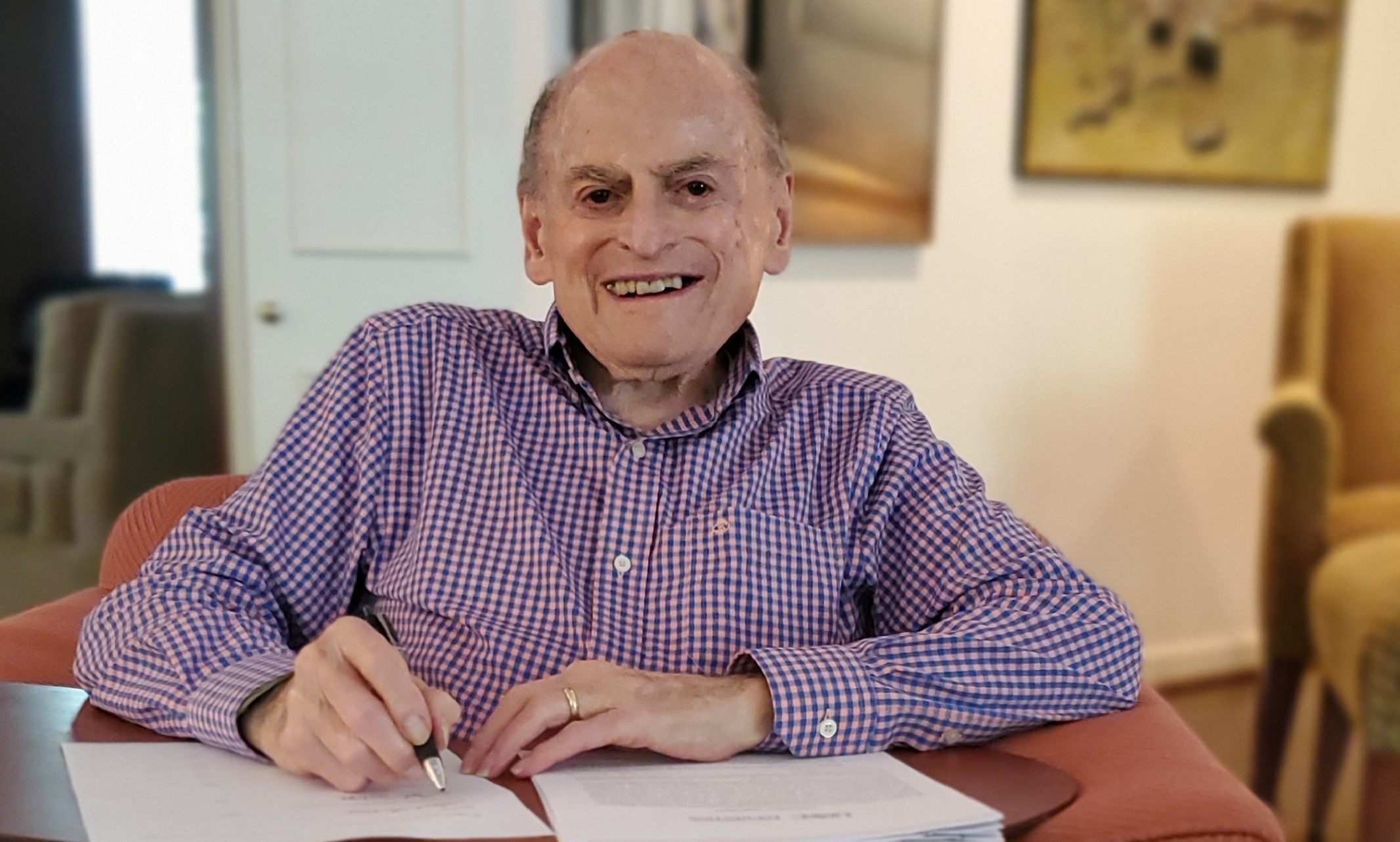
Focus on kindergarten through third grade literacy has long-term impact
Moved by the ramifications of children’s inability to read at grade level by third grade, Kansas City civic leader and dedicated education donor, Bert Berkley, has established an endowed fund of $50,000 to support the Bert Berkley Award for Excellence in Early Childhood Literacy at UMKC.
The fund will provide scholarships to individuals and awards to teachers, school administrators and organizations within the field of childhood literacy, and specifically phonics, to encourage and recognize progress in this area. The UMKC School of Education will recognize recipients at the Urban Education Forum.
Berkley is committed to early childhood education and the scientific approaches to the study of literacy, including the use of phonics.
“I’ve had a particular focus on the importance of reading skills,” Berkley says. “We have many challenges in reading at grade level here in Kansas City as well as nationally. The School of Education at UMKC does an outstanding job of training teachers for the urban classroom. My motivation for the creation of this endowment is that my late wife, Joan, and I have always believed that the power of education is what provides opportunity for young people.”
Recipients of the award will demonstrate long-term dedication to teaching reading to students in kindergarten through third grade, achieve significant progress in student reading levels and make effective use of research-based instruction methodologies of teaching reading including the use of phonics.
“Bert has been tireless in his support of literacy for children in early education,” Carolyn Barber, interim dean of the School of Education says. “In creating this award, the UMKC School of Education joins with Bert in recognizing outstanding achievement in the field of early childhood literacy.”
Establishing strong reading skills by third grade is a determining factor in long-term academic success.
“An abundance of research has affirmed the critical importance of early reading achievement,” Nora Peterman, assistant professor of language and literacy, says. “Third-grade reading proficiency is one of the most powerful predictors of a child's continued academic success and of graduating from high school. Educational equity can only be realized when all students have access to excellent, effective literacy instruction in schools.”
Berkley is a previous recipient of the Hugh J. Zimmer Award for Excellence in Urban Education. The award recognizes urban educators and urban education supporters from the region who are following the example of passion and commitment to urban young people and their communities set by former UMKC Trustee and UMKC Foundation board member Hugh Zimmer. The Zimmer Award is also announced at the Urban Education Forum.
“We are fortunate that the UMKC School of Education has such a stalwart supporter in Bert Berkley,” Mauli Agrawal, chancellor of UMKC says. “His impact on the quality of education in Kansas City is immeasurable. We are honored that he has established this critically important award at UMKC.”
A former chair of the UMKC Board of Trustees and recipient of the Chancellor’s Medal, Berkley is the founder of the Local Investment Commission (LINC) , which has nothing to do with stocks and bonds, but everything to do with investing in children and families. LINC provides social services to those in need, including thousands of children. He is a decorated veteran of World War II and Korea, graduated from both Duke University and Harvard Business School and served on many local and national boards.
Aug 20, 2021
-
Flatland interviews Arnold Abels
Arnold Abels, Ph.D., director and clinical coordinator of the UMKC Counseling Center, was interviewed. He said a decrease in clients at UMKC is partially due to licensing that only allows them to serve residents of Missouri or Kansas. Read the full article.
Aug 19, 2021
-
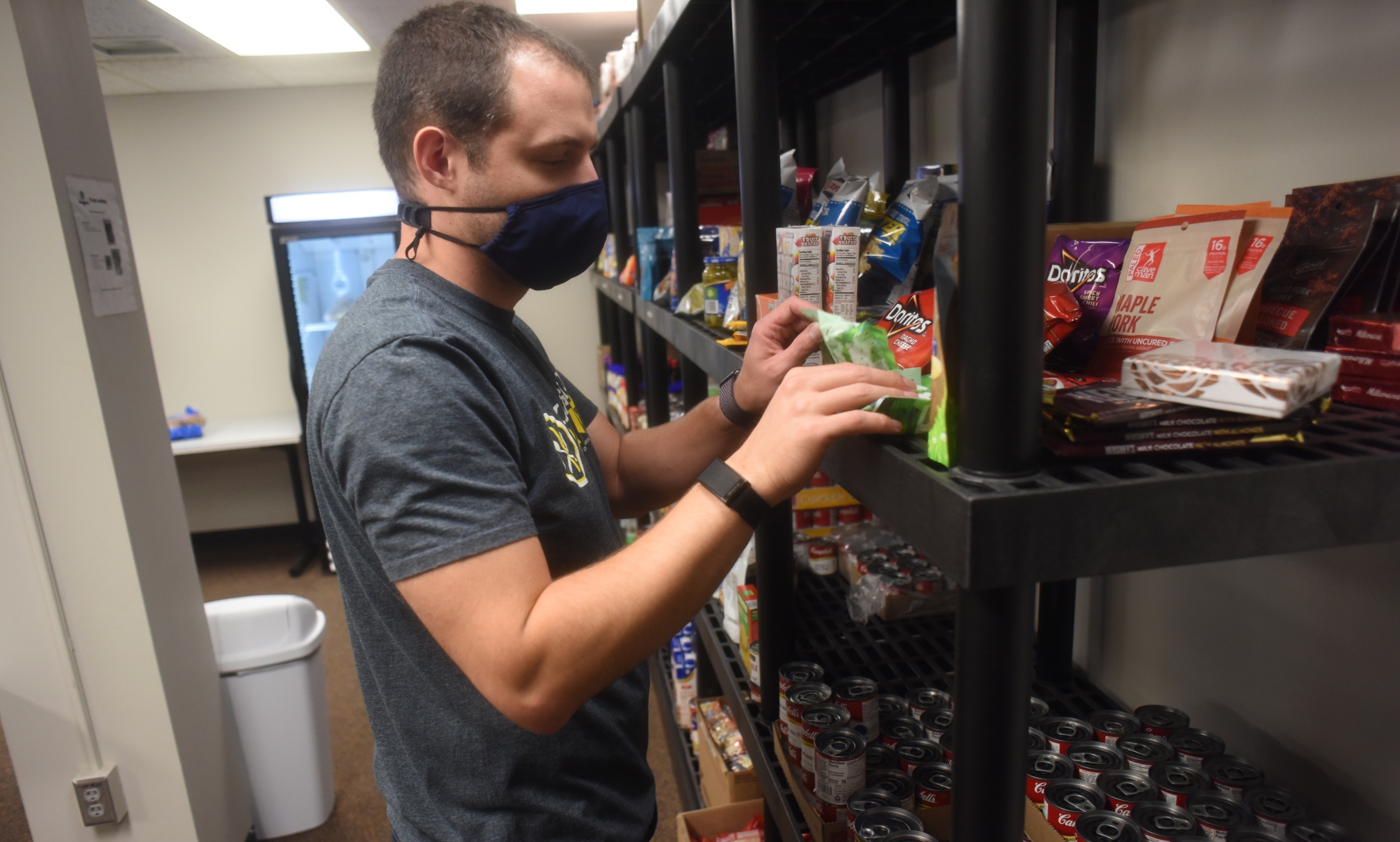
The pantry ensures no Roo goes without, especially during the pandemic
The UMKC Kangaroo Pantry has expanded its reach to help more Roos in need as the pandemic has left more hungry.
During the 2019-2020 school year, the pantry distributed 9,873 pounds of food. Last school year, their output more than doubled, as they distributed 22,140 pounds.
"This is different than anything we've seen. We're seeing more students than we have probably seen in a very long time," Taylor Blackmon, basic needs coordinator said.
The pantry has been able to meet the increased need through things like donations and partnerships with companies and organizations such as Hiland Dairy, Whole Foods and Harvesters Community Food Network.
Anthony Maly, senior program manager, said financial donations and partnerships have been extremely important to the pantry over the last couple of years.
"We really couldn't operate without that financial assistance," Maly said.
Opened in 2015, the Kangaroo Pantry provides food assistance for all Roos in need, including students, faculty and staff. Because of donations, within the last year the pantry has seen some new additions, like a refrigerator and freezer that houses fresh produce, meats and free Hiland Dairy products.
The pantry has also expanded its offerings to include items such as feminine hygiene products, dog food and baby formula.
"We believe that no Roos should go without, and that includes hygiene products, laundry detergent, whatever students, faculty or staff might need to meet their most basic needs. We want to make sure that we can provide that," Maly said.
How to receive assistance from the Kangaroo Food Pantry:
If you are a UMKC student, faculty or staff member who needs assistance, bring your university ID to the pantry to shop during the pantry's open house hours. Masks or face coverings are required regardless of vaccination status.
All Roos are eligible to pick roughly 20 food items per week, but fresh produce does not count toward those 20 items.
While the pantry does place a limit on items, Blackmon said they are willing to work with those who may have increased need for additional items.
"We do have some people who are utilizing this service that are shopping for their families and not just going back to their dorm rooms. In those cases, especially if there are children involved, your items won't be counted," Blackmon said.
"We believe that no Roos should go without." — Anthony Maly
Locations and hours:
The Kangaroo Food Pantry's main location can be found at 4825 Troost, Room 103. It's open Tuesday 1:30-5:30 p.m., Wednesday and Thursday 1-5 p.m. and Sunday 3-6 p.m.
If you are unable to make any of those hours, Blackmon said appointments can be set up.
The main location features a "full client choice model" which means individuals can walk the aisles and 'shop' for the items they want, instead of simply picking up pre-packaged bags of items.
In addition to the main campus, and due to increased need, the Kangaroo Food Pantry has also launched two satellite locations. One is in the Health Science District, on the first floor (Room 1-402) of the School of Medicine. It's open from 8 a.m.-5 p.m. for students to pick up pre-packaged bags of items.
The second satellite pantry is in the UMKC Student Union on the 2nd floor near Jazzman's. The pantry is "shelf-style," meaning students walking by can quickly grab whatever they like without having to "check out," or pre-order.
Blackmon said all of the locations are meant to encourage everyone to take advantage of the resources the Kangaroo Food Pantry offers.
"This is here for you. There is no stigma here," Blackmon said.
How to support the Kangaroo Food Pantry:
While the pantry does accept donated non-perishable food, monetary donations are encouraged, as the pantry can stretch a dollar further through partnerships than the average grocery store shopper.
If you would like to make a financial contribution, click here. Those interested in volunteering to work at the pantry can sign up here.
Another way to support the Kangaroo Pantry is to participate in the upcoming UMKC Virtual 5K which runs from Sept. 25- October 3. Registration is $25 and all proceeds support the pantry.
Aug 18, 2021
-
Mary Anne Jackson shares insights with media
Real-world studies that show declines in immunity among vaccinated people make clear the need for additional protection, according to Mary Anne Jackson, infectious disease specialist and dean of the University of Missouri-Kansas City School of Medicine. Read the article.
More news coverage for Mary Anne Jackson
Kansas City Health Experts Question Claims In Northland Parents' Lawsuit Over Mask Mandates - KCUR
Vaccinated And Confused In Kansas City? How To Decide Whether An Activity Is Safe - KCUR
Aug 18, 2021
-
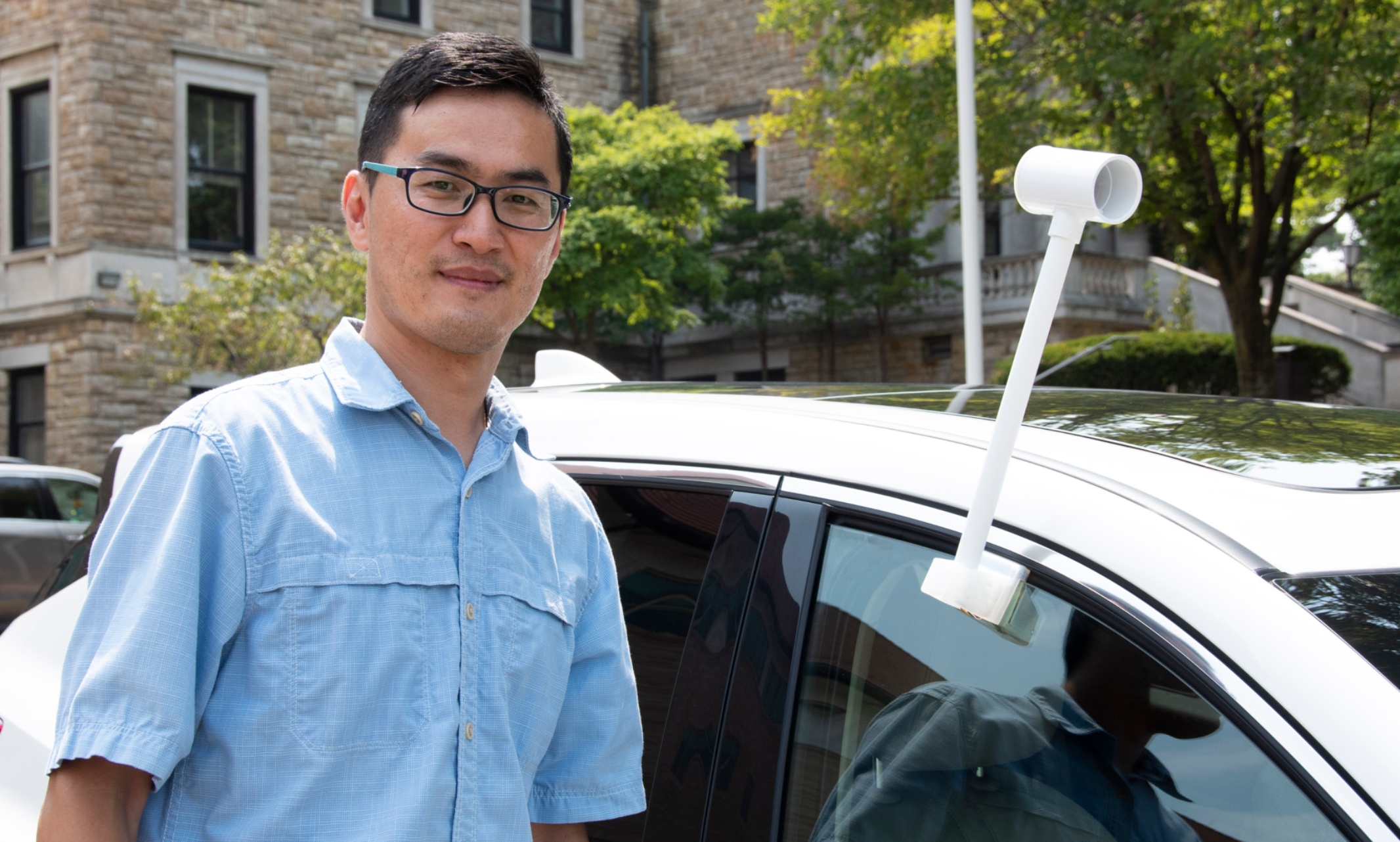
Volunteers from across the metro helped collect data for a national research project
Dozens of volunteers took their marks across Kansas City on a hot, August day. Their mission: Take an hour-long drive to find out more about how heat is distributed throughout the city.
Kansas City is one of about a dozen cities taking part in a nationwide research project funded by the National Oceanic and Atmospheric Administration. The goal is to create a map indicating where there are pockets of land that are warmer than surrounding areas. Researchers call these areas urban heat islands.
UMKC Earth and Environmental Sciences professor Fengpeng Sun, Ph.D. is leading the Kansas City cohort of the experiment. He said while most people are familiar with how greenhouse gas emissions contribute to global warming, they should also be aware of how land use and land cover change has impacted temperatures.
“You think about the Kansas City area compared to 30 years ago. We have more buildings. We have more concrete and more asphalt, we have less trees, less soil,” said Sun. “We want to utilize this project to showcase how the temperature has been distributed across our community.”
For the study, volunteers mount a sensor on their cars, which records the air temperature, air humidity and GPS location every second. Then they drive an 80-square-mile loop mapped out in advance. After that, the data is sent back to NOAA, which combines it with satellite data to produce a map that shows where the heat islands are located.
The volunteers included UMKC students and faculty, community members and employees of UMKC community partners and the city of Kansas City.
Amanda Mercier is an environmental science major. After volunteering for environmental projects around the world for several years, she decided to pursue a degree with hopes to make a larger impact. She said she was eager for a chance to work with Sun and to contribute to research.
“As soon as they were letting people back on campus, I think I was one of the first people to sign up for this,” said Mercier.
NOAA is expected to return the data in about two or three months. After that, Sun said the research his team collected can be used in a variety of ways to help mitigate the issue of heat islands in Kansas City, from comparing his data to social impact data to helping inform city government decisions.
“They are the policy makers. Hopefully my voice, the results that we get, can be heard by them,” said Sun. “It’s very important for them to develop some kind of adaptation strategy and also mitigation strategy. Make sure that your city, that your area is going to be sustainable and, most importantly, it’s going to be resilient enough in a warming world.”
It could also help project partner and local non-profit Bridging the Gap with its Master Urban Forest Plan that the city adopted in 2020.
“We will eventually be able to see, through this data, where we might want to concentrate more of our tree planting efforts,” said Kristin Riott, the non-profit’s executive director.
Most importantly, Sun said, he wants the community to be engaged and to see the results. It is why he invited community volunteers to help collect the data. He even arranged the routes to go by recognizable Kansas City landmarks so that once the results from the research were published, they would be more relatable to the public.
“It can give people more of an impression about the data,” said Sun. “Climate change is not something really far away from us. It’s happening. It’s happening in our neighborhood. And we know that we are experiencing more and more heat days, and this is exactly what we want to convey to people. It can happen anywhere. The impact could be different, but it can happen everywhere.”
The data collection led by Sun came just days before the United Nations released an urgent report warning that climate change is widespread, rapid and intensifying; and exactly a week before NOAA announced new data showing July 2021 as the hottest month ever recorded on earth.
“We all need to do this together, we’re running out of time,” said Mercier.
Aug 16, 2021
-
Fengpeng Sun's research is the focus of media coverage
The project in this article is coordinated by Fengpeng Sun, a climate scientist and assistant professor at the University of Missouri-Kansas City. The project gathered tens of thousands of data points in one day. The Kansas City effort is part of a larger nationwide campaign to map urban pockets where temperatures can be nearly 10 degrees higher than outlying areas.
Hunting for Hot Spots in Kansas City’s Climate - Flatland
City Dwellers Swelter In Heat Islands as High Temps Hit Neighborhoods Unequally - National Catholic Reporter
Kansas City Suffers from Severe Urban Heat. Research Now Underway Might Help Leaders Address It. - Kansas Reflector
Aug 13, 2021
-
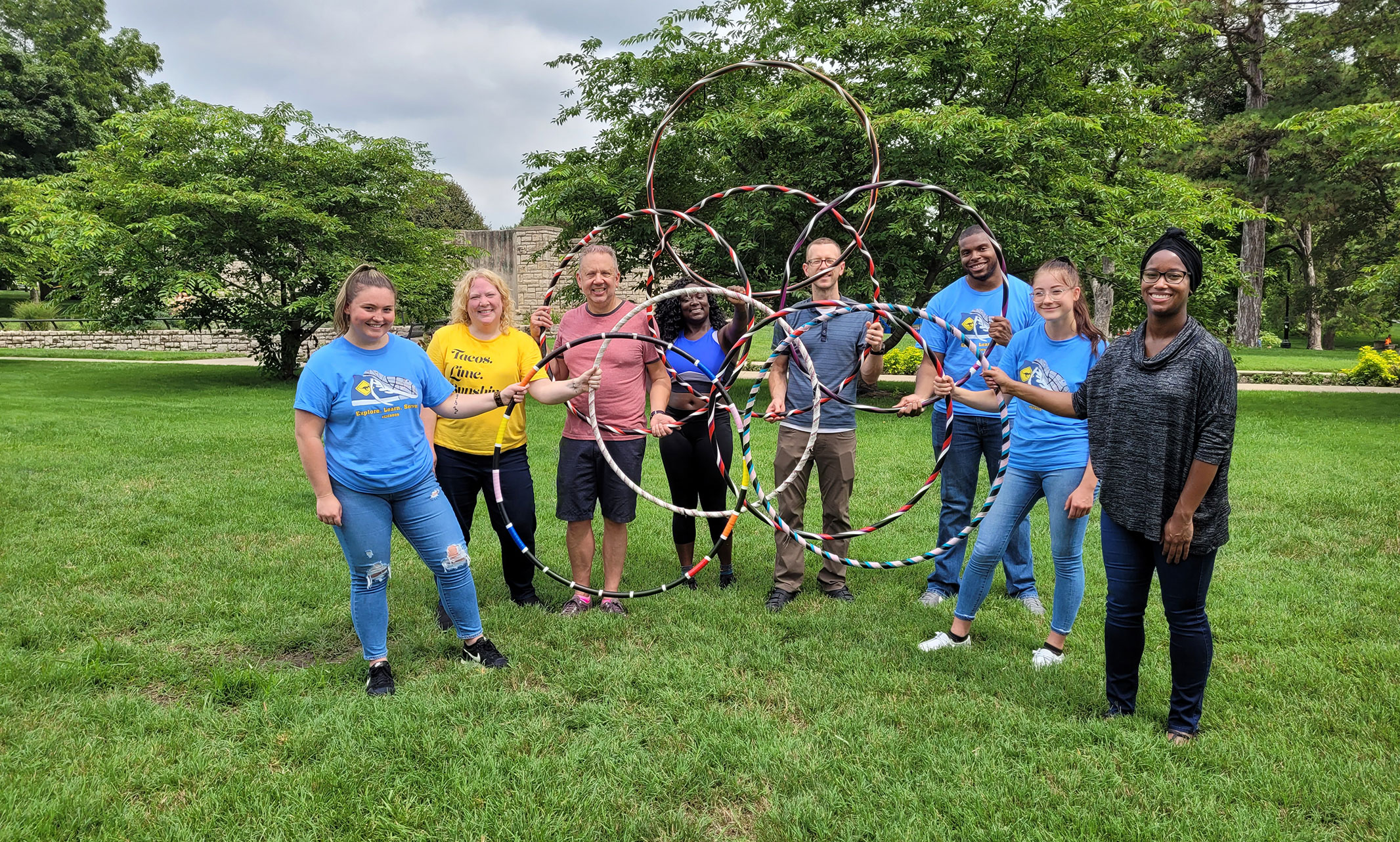
Students work with community in new field exploration course
Field experience in the community in your chosen profession is a hallmark of a UMKC education. Thus summer, criminal justice and criminology students worked in a wide range of outreach programs connected to the justice system.
Each week brought them to a different community service in the Kansas City area, including law enforcement outreach, addiction recovery and underserved youth, where they could see first-hand how their careers could make an impact. This unique field exploration course was spearheaded by professor and internship coordinator Misty Campbell.
“I wanted to provide an opportunity for students to see what everyday tasks are for those working within the justice system and the various roles one can play within different positions,” Campbell said. “Students were able to engage with a fundraising event, community policing, data collection, strategic planning, observe a facilitated training on trauma and learn about the core tenants of a multi-service agency. My goal was to provide a deeper exploration of careers and professional tasks associated within the diversity of justice-oriented professions.”
Psychology, criminal justice and honors program student Leah Maass completed the course with a better idea on where she wanted her career to go.
“I knew I wanted to work as a paralegal but after spending time at each site, I realized I could also explore a different route while still working with legislation,” Maass said. “This class was an amazing opportunity to immerse myself in the community.”
Leah Maass (second from left) and Jahvon Parker (fourth from left) with their classmates on site at Synergy
Criminal justice student Jahvon Parker is ready to graduate at the end of this next semester. The course hasn’t altered his career plans, but he had other reasons to participate.
“I knew Misty was a great teacher, so I had to enroll,” Parker said. “I learned a lot of valuable lessons that will benefit me throughout my entire life. It was so real and humbling.”
The course served as a true win-win situation: students got first-hand experiences to serve them in their lives and careers and community members benefitted from the students’ work as well.
“My hope is that our course showcased to our community partners the various levels of engagement and support our students, and the department, can provide them,” Campbell said. “I also wanted to encourage students to think about how they can support agencies with volunteer and internship roles they’ve not considered before. Our partners are doing phenomenal work, and I want them to feel the tremendous value and respect we hold for them. Part of that, to me, is about showing up and asking how we can serve with them.”
Learn more about the criminal justice and criminology department, and the courses they offer, on their website.
Aug 12, 2021
-
Novak tells Toriano Porter that Kansas City is on pace to ‘be one of the deadliest’
Toriano Porter, Kansas City Star reporter, talked to Ken Novak, a professor of criminal justice and criminology at UMKC, for this column. Read the full article. (subscription required)
Aug 12, 2021
-
Associate Professor Jacob Wagner weighs in
Mobile home parks are difficult to find in Kansas City. University of Missouri-Kansas City Associate Professor Jacob Wagner says mobile home parks make up just around 1% of living spaces in the city. Wagner, who teaches Urban Planning and Design, says that mobile homeowners stand to lose a lot in this deal. Read more from KCUR.
Aug 12, 2021
-
The Independent covers upcoming music composition contest
UMKC Conservatory doctoral student Yunfei Li is among the six Kansas City performing artists selected this summer as winners of the Charlotte Street Foundation’s first annual New Music Composition Competition. Each will produce a brand-new work to be performed by the locally-based Ensemble Mother Russia Industries at a concert on Oct. 2. Tim Harte, the first UMKC Conservatory student admitted with the computer as his “instrument,” formed Ensemble Mother Russia Industries in 2008 as a non-traditional performance ensemble. The Foundation chose Harte to spearhead the process and the performance. Read more.
Aug 12, 2021
-
Mahreen Ansari explains why College Democrats of Missouri cut ties with College Democrats of America
Mahreen Ansari, University of Missouri-Kansas City student and president of the UMKC College Democrats, was interviewed. She also served as communications director of the College Democrats of Missouri. Read more.
Aug 11, 2021
-
Chronicle of Higher Education interviews UMKC Honors student Nikita Joshi
UMKC Honors student Nikita Joshi received the 2021 Frederick Douglass Global Fellowship, a competitive award for a diverse group of student leaders to attend a four-week summer study abroad program focused on leadership, intercultural communication and social justice. She was part of the group of students at Queen’s University Belfast who were interviewed for this story. Read the full article.
Aug 11, 2021
-
The Kansas City Beacon interviews Ken Novak
Ken Novak, a professor of criminal justice and criminology at the University of Missouri-Kansas City, said investigations will likely pick up speed under the Biden administration. Read the full article.
KCUR picked this story up on Aug. 18.
Aug 11, 2021
-
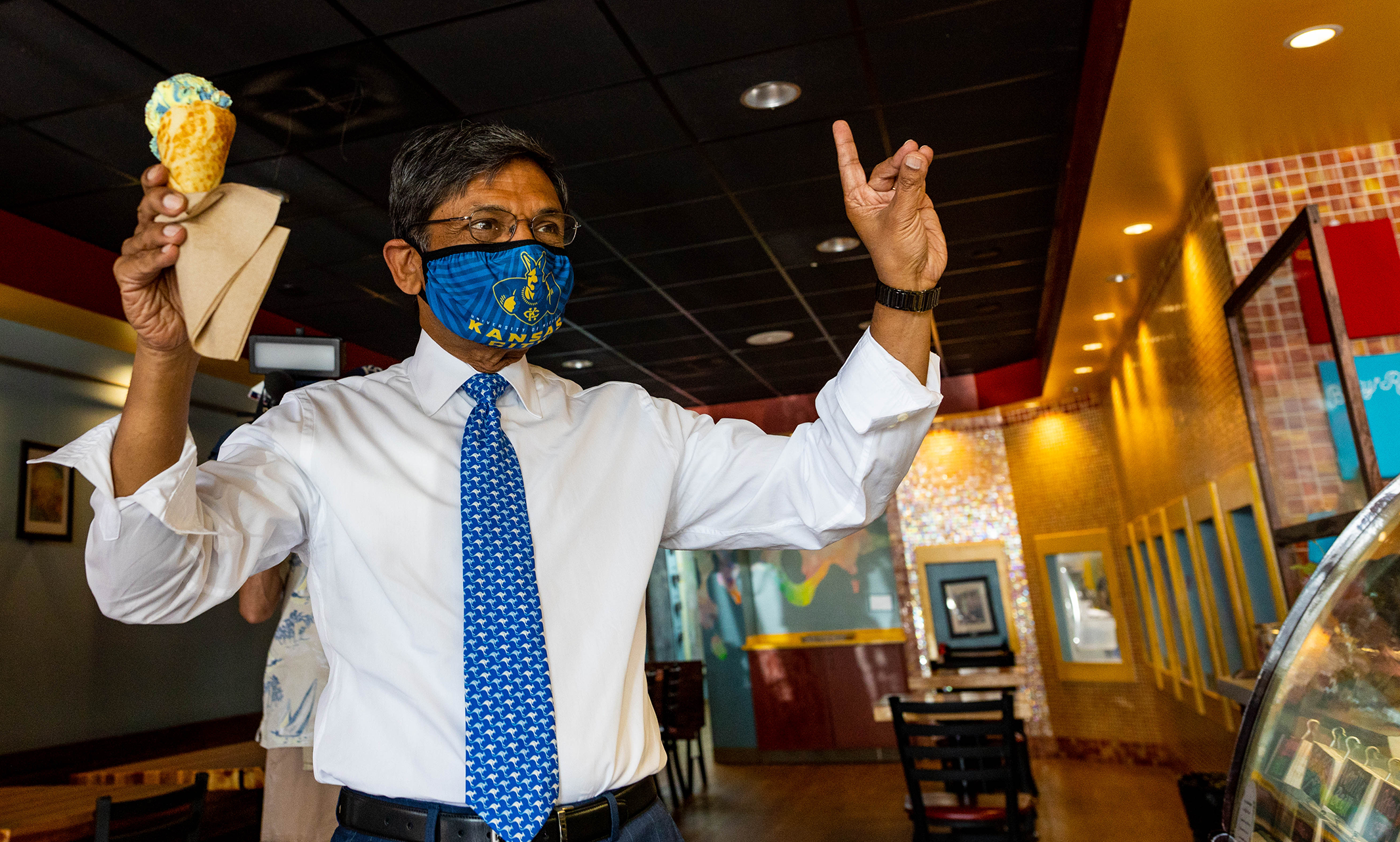
Shop’s new sensation is Roo Blue!
A partnership with a favorite local business is proving a sweet success.
Betty Rae’s, a local ice cream shop, has created a UMKC-inspired flavor dubbed the Roo Blue Swirl. The shop’s owner, Alec Rodgers, graduated from the Henry W. Bloch School of Management in 2020.
Rodgers himself placed the brand new sign in the ice cream case.
“Less than two years after graduation, I’m already a small business owner. That’s the kind of impact UMKC has and what Roo Blue Swirl really represents,” Rodgers said “We’re honored to be partnering with UMKC to create something for the university community, making their campus experience even more enjoyable.”
“UMKC’s continued involvement with small businesses and the overall community in Kansas City encourages students and alumni to engage with local businesses in effective partnerships.”
The Roo Blue Swirl is blueberry and lemon ice cream with crumble cookie mixed in.
Elora Thomas, director of admissions at UMKC, was thinking of a sweet treat she could offer new students when inspiration struck.
“I love Betty Rae’s ice cream!” Thomas said. “So, when I saw that Alec, the owner, was a UMKC alum, it made me even more excited to support this local business. I reached out to Alec and suggested the idea of a UMKC-themed flavor. He also saw the potential, not only with incoming and current students, but with staff, faculty and alumni as well. UMKC is such a community gem, and this is a great opportunity to reveal that while also giving back to Kansas City.”
Rodgers gives Chancellor Agrawal the first scoop of Roo Blue Swirl.
Of course, the most important question is what flavor would do this great university justice?
“The Roo Blue Swirl combines lemon and blueberry with a buttery crumble throughout.” Rodgers shares. “The flavor is delicious and embodies the great colors of UMKC.”
Aug 11, 2021
-
Students, employees can win free parking, $500 gift cards
UMKC is now offering a series of prize drawings as an incentive for students, faculty and staff to become vaccinated against COVID-19.
Prizes include free annual parking passes and $500 Visa gift cards. Separate drawings will be conducted for students and employees. To be eligible for the drawings, students and employees must upload an image of their vaccination card to a UMKC database.
Students can upload their images by signing in to Pathway. Employees should use the vaccine uploader link available through MyHR. Even if you have previously uploaded vaccination information elsewhere, you must use these links to be eligible for the drawings.
Two student drawings and two employee drawings have been scheduled. Each of the four drawings will offer 10 free annual parking passes and 10 $500 Visa gift cards.
The first student and employee drawings will take place Sept. 1, and the second pair of drawings on Oct. 15. To be eligible for the first drawing, you must upload your vaccination card before Sept. 1. Those who upload vaccination cards between Sept. 1 and Oct. 15 will be eligible for the second drawing.
Aug 10, 2021
-
Faculty, staff, volunteers and students included
The University of Missouri-Kansas City is now requiring COVID-19 vaccination for all faculty, staff and students who work in clinical settings and have direct contact with patients as part of their UMKC work or training. Students and employees must meet the requirement by Oct. 1, according to a campus letter sent August 10. UMKC students, faculty and staff play a significant role in providing healthcare to greater Kansas City and the state of Missouri. The requirement affects faculty, staff, volunteers and students of the schools of Dentistry, Medicine, Pharmacy and Nursing and Health Studies. In addition, the requirement applies to faculty and students in masters and doctoral training programs in Psychology, Counseling, Counseling Psychology and the School of Social Work engaged in external field education and clinical practica or clinical intervention studies. UMKC faculty, staff, volunteers, and students with patient contact at the University Health Center, UMKC Counseling Center and the Community Counseling and Assessment Clinics are also subject to the requirement.
UMKC officials said the vaccination requirement is necessary because COVID has entered a new phase, citing Centers for Disease Control and Prevention advisories that the Delta variant spreads more easily and quickly than other variants, driving higher infection and death rates and putting significant strain on healthcare resources. The university is offering students and employees the opportunity to apply for medical or religious exemptions to the requirement. For all other UMKC students, employees and visitors, masks will continue to be required in classrooms, laboratories, libraries, meeting rooms and other public indoor settings regardless of vaccination status. Individuals who have not been vaccinated against COVID-19 will continue to be required to wear masks at all times while on campus, indoors or outdoors.
Aug 10, 2021
-
You might be safe if you have the right skills, according to new Bloch School research.
Will a robot be replacing you at your job? It will depend on what skills you have, according to Bryan Hong, professor of entrepreneurship and management at the UMKC Henry W. Bloch School of Management.
According to new research conducted by Hong and his coauthors, adding robots to an enterprise increases demand for jobs requiring a bachelor's degree or higher, as well as jobs requiring no postsecondary education. But those with a vocational education or a community college education, as well as managerial roles, weren't so lucky.
This conclusion was reached after studying five years of data on businesses in the Canadian economy. Their research is among the first of its kind to show how robots are changing employment, the structure of organizations and other aspects of the workplace.
"A lot of people are already getting the sense that this is a new trend, and our data shows that investments in robotics are really taking off," Hong said. "This is a trend that's only going to continue."
Hong breaks down the research for us on what it means and how it will affect the future of employment.
The main question is, are robots taking our jobs?
That's a tough question to answer with a simple 'yes' or 'no.' It's complicated. What we found is there are very different answers depending on who you are inside the company when the robots come in. If you are someone with a bachelor's degree or above, which is one measure of workers with relatively high skills, we see an increase in the number of employees. There's also an increase in what we might call "unskilled" employees or those who have no postsecondary education, doing roles that require very little training. But if you are in a class of jobs that require a vocational degree, like tradespeople who have gone to a two-year college or gotten a certificate, these jobs are being eliminated by the robots. We also see a significant decline in managers.
Let's start with the groups that are experiencing increases in employment. Why is there an increase in the group with college degrees and "unskilled workers"?
When you buy robots, you need people who have the skills to work with them. For example, robots may have to programmed or you might need to do a lot more design work if robots are producing many different types of products than the factory used to produce. That requires people with the skills to do those things. The increase in unskilled workers is a different story. It turns out that robots aren't good at doing all physical labor tasks — the technology has its limitations. So for these types of tasks, such as loading trucks with inventory, humans are still needed because the robots can't do them well. But these aren't jobs that require a lot of education or training and are also not likely to pay high wages.
Why are workers with a community college or vocational education being negatively impacted?
The type of work robots are capable of is often what humans with vocational degrees do. For example, it could be welding a passenger door onto the body of a car. Now imagine a robotic arm that will repeatedly do that task, over and over again. That robot can do that same task flawlessly thousands of times a day. Robots can do that, and they don't get tired. They also don't unionize and don't raise the same safety issues that using humans might. So, you can see why a company would look at that and think it's compelling.
If I am one of those workers, should I be nervous about these findings?
Yes, it's a cause for concern. The issue is that robots increasingly do what these workers can do, and in many cases, do it better. This is also part of a larger story many people have already heard, but not about robots specifically. Many people who lose these jobs are unlikely to move on to higher-paying jobs so often the best-case scenario is that their wages will decline if they are able to find a new job. This raises a much broader set of questions about the increasing inequality we see in our society, and robots may at least be partly responsible for it.
What's going on with managers?
As of today, robots don't manage people. So we think the reason we see fewer managers speaks to the question of 'what do managers really do.' When we think of managers in companies, we usually think of someone who supervises workers every day. They keep an eye on things and make sure that employees are getting the work done. If you imagine a manager on a factory floor, maybe they also deal with whatever problems come up each day. Now, if we replace over half of the employees with robots on an assembly line, do you need as many managers to make sure that people are doing their jobs? Probably not. But it's also not this simple. One could imagine that the increase in jobs requiring at least a bachelor's degree and unskilled jobs would require more managers to oversee them, but it's clear that even if that is true, the total need for managers still decreases. That might suggest that managing each type of worker requires a different type of management. But that's something that needs more research for us to understand better.
What does this mean for the future of some of these jobs?
Companies invest in technology because it improves their profitability. If it is more profitable to use robots instead of humans for certain tasks, companies will ultimately move in that direction. If we look at the results of our story, it's clear there are some types of workers who will be negatively affected. We need to think about how to address that as a society.
Aug 10, 2021
-
Flatland interviews UMKC History professor
“Missouri was born in the midst of controversy about slavery and its extension into the West,” said Diane Mutti Burke, a professor of History at the University of Missouri-Kansas City, who served as a consultant on, “Struggle for Statehood,” a traveling exhibit that is scheduled to be installed in Lee’s Summit in September. Read the full article.
Mutti Burke was also interviewed by KCUR about Missouri's Bicentennial.
Aug 10, 2021
-
Kansas City Star highlights UMKC Innovation Center’s entrepreneur hotline
From April to October, the University of Missouri-Kansas City Innovation Center’s entrepreneur hotline had a 176% increase in calls asking for assistance, according to the UMKC Innovation Center Impact Report. Of those calls, the center reported a 367% increase in the number of people who reported starting a business. Read the full article. (subscription required)
Aug 10, 2021
-
Energy News Network features Fengpeng Sun's research
A coalition of partners led by University of Missouri-Kansas City researcher Fengpeng Sun gathered the measurements and will now create a map combining tens of thousands of temperature and humidity measurements with a satellite map, allowing them to quickly learn the conditions in a given location. Read the full article.
Aug 09, 2021
-
The university will work hand-in-hand will Auburn University, as well as other colleges across the country, to research ways to increase STEM degre...
The University of Missouri-Kansas City will backbone a $10 million research effort from the National Science Foundation, or NSF, to promote science, technology, engineering and mathematics, or STEM, education among students with disabilities.
Auburn University will lead the five-year project while UMKC will "backbone," or guide vision, strategy, support aligned activities, establish shared measurement practices and support the implementation of research, according to the NSF.
As the backbone, UMKC will host the portal and website for the project, as well as lead data collection.
Alexis Petri, Ed.D., senior director of faculty support at UMKC, said she has already begun working with Overtoun Jenda, Ph.D., whose office at Auburn will be chairing the initiative, to delineate what aspects of the project will be led by UMKC and which by Auburn.
The project's funding will be used to conduct research related to enhancing workforce development opportunities for people with disabilities.
Students involved in the research will receive benefits including peer and faculty mentoring, research opportunities and financial support to track which efforts work best to increase the number of students with disabilities entering college and completing a degree in a STEM-related field.
Overall, the research project will target three objectives, two focused on students and the other on institutions:
Increase the number of students with disabilities completing degrees in STEM.
Facilitate the transition of students with disabilities from degree completion into the STEM workforce.
Enhance communication among institutions of higher education, industry, government and local communities.
The project will encompass 27 universities, with five "hub-leading institutions." Those institutions include UMKC (Midwest Hub), Northern Arizona University (Mountain Hub), Ohio State University (Northeastern Hub), the University of Hawaii-Manoa (Islands Hub) and the University of Washington (West Coast Hub).
The Midwest Hub will initially consist of the University of Wisconsin-Milwaukee, Little Priest Tribal College and Wichita State. At least five other colleges and universities are slated to be added within the next year, Petri said.
In addition to being the backbone of the organization, UMKC will also undertake a research project with the help of $2.4 million of the grant, which will be distributed over the course of the next five years.
UMKC's research will look at student success across critical junctures such as access, entry, progress, completion and transition.
"The idea is to help students have momentum moving across critical junctures like from graduation to employment. Those are times when students are likely to face challenges or barriers to their goals," Petri said. "Knowledge gleaned from the study will be available to (other research institutions) for mid-course adjustments and ultimately to discover how well-known interventions like mentoring, applied in combination with other success programs, lead to innovations that improve degree completion for students with disabilities STEM majors."
Research chairs at UMKC will include Jacob Marszalek, Ph.D., professor and Director of Applied Cognitive Brain and Brain Science, Yugyung Lee, Ph.D., professor of computer science, Fengpeng Sun, Ph.D., professor and climate scientist, and Ye Wang, Ph.D., communications professor.
The grant began on Aug. 1 and will last until July 31, 2026. Research is tentatively scheduled to begin in 2022.
The award is part of the NSF INCLUDES initiative which invests in programs that address diversity, inclusion and participation challenges in STEM at a national scale. The initiative is one of five INCLUDES awards given by the NSF this year.
Aug 06, 2021
-
Dos Mundos highlights UMKC Institute for Urban Education
A program at the University of Missouri-Kansas City School of Education is working to increase the number of diverse and “exemplary” teachers in urban schools across the Kansas City area. Called the Institute for Urban Education, the cohort model program prepares students to teach in Kansas City urban schools. Read the full article.
Aug 05, 2021
-
Jacqueline Rifkin explains the ordinary in the extraordinary
Have you ever wondered why you have so many notebooks you’ve never used? Or candles you’ve never lit? Or clothes that you don’t wear? And you can’t seem to part with any of these items?
This phenomenon is known as clutter, an overabundance of possessions. Jacqueline Rifkin, assistant professor at the Henry W. Bloch School of Management, asked herself how this accumulation begins in the first place.
“I had a t-shirt that I had bought at a standard retail chain,” Rifkin said. “But in my mind I would wear it on a date night. I would wear it on a job interview. I would wear it to a rehearsal dinner. It was an ordinary t-shirt, but it became this thing that I needed to protect for the perfect occasion—just because I hadn’t worn it previously. I talked to different people, and this resonated with them, too. They said ‘I have a bottle of wine from Trader Joe's, but I've just never opened it. It's been years,’ or ‘I have this cologne that I got for free as an add-on with another purchase, but I haven't touched it because nothing seems special enough.’”
Rifkin had this same conversation with her co-author, Jonah Berger of the University of Pennsylvania, and they decided to get to the bottom of why we avoid using ordinary things, treating them as if they are too special to use. Through the six studies, the two found that forgoing using an item makes it seem more special, particularly when someone believes that they were waiting for a later occasion. As the item starts to feel more special, we want to use it less. As time goes on without the item being used, specialness increases further, which leads to even less usage—which Rifkin calls a “specialness spiral.” The item becomes less likely to be used in ordinary occasions, and more likely to be saved for a narrower set of extraordinary occasions.
While that may seem harmless, Rifkin shares how holding onto these items and generating clutter can become a maladaptive behavior.
“There's been plenty of research suggesting that clutter can be bad for our well-being,” Rifkin said. “It can mess with our ability to get work done. It can mess with our social relationships, and that can cause chronic stress. When it comes to that bottle of wine or the t-shirt, that special situation you are waiting for may never come. Worst case scenario is saving that bottle of wine for so long, it turns into vinegar, or saving the shirt for so long, it goes out of style. You don't even get to enjoy it.”
Fortunately, there is a way out. Rifkin suggests the easiest is this: use your stuff.
“One thing that we talked about is pre-committing to usage occasions,” Rifkin said. “If I buy a nice t-shirt, I’ll tell myself ‘I'm going to wear it this weekend.’ Setting a specific occasion or a ‘first possible occasion’ kind of commitment can break the specialness spiral. Hopefully, we’re harnessing the knowledge that can help us avoid clutter accumulation, avoid wasting time and money on possessions, and allow ourselves to actually use these things. Wearing that shirt after a few iterations of deciding not to can feel really good.”
Learn more about Rifkin’s findings on how clutter accumulates by reading her article in the Journal of the Association for Consumer Research.
Aug 04, 2021
-
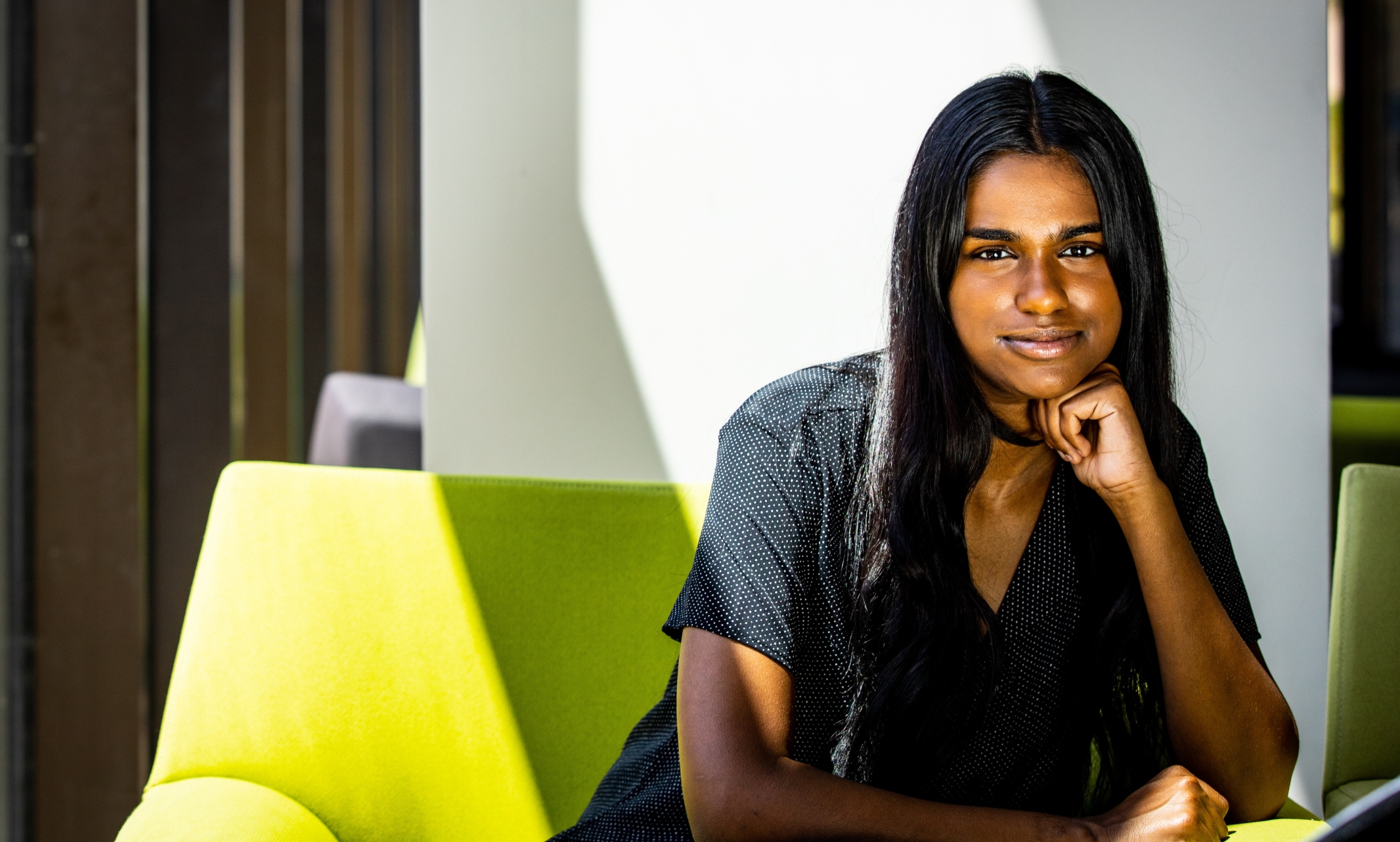
Krithika Selvarajoo takes challenges in stride
Our ongoing story starts with people from around the world, converging here at UMKC. Get to know our people and you’ll know what UMKC is all about.
Krithika Selvarajoo (Krit)Anticipated graduation year: 2021UMKC degree program: B.A. in English and Chemistry; Honors ProgramHometown: Singapore
Why did you choose UMKC?
Coming from a city, I knew I wanted a college experience where I would be able to explore a new city during my down time. I thought Kansas City was the perfect place for me to have that experience and smoothly transition to college. Also, I loved the diversity that UMKC offers and knew it would provide me with endless opportunities to meet new people.
Why did you choose your field of study?
I've always been passionate about both the arts and sciences, which led me to pursue degrees in English and chemistry. Instead of being dichotomies, I knew the fields of English and chemistry would complement, if not overlap, each other and provide me with an education that would help me continue to develop into a well-rounded individual.
What are the benefits of the program?
Both degrees have allowed me to explore the intersection between science and literature while developing skills that pertain to both of those fields. For example, I've learned the importance of paying close attention to details with both lab data and literary prose.
How has your college program inspired you?
I've been inspired to pave my own path for my future self. I was initially hesitant on majoring in two subjects. But after my first semester as a double major student, I realized I have never been happier. From that moment, I knew the importance of paving my own path. Everyone's journey is different in their own way.
Since entering college, what have you learned about yourself?
I've learned that stepping out of your comfort zone is important to grow as an individual. During my sophomore year, none of the student organizations at the time caught my interest. Rather than not being involved, I decided to start a Her Campus chapter here at UMKC. It was out of my comfort zone, especially since I had to build an organization from the ground up and go through various interviews and edit tests with Her Campus Media, but I am glad I took a leap of faith.
Creating a community that empowers women on campus while providing them an outlet to express their voices has been such a fulfilling experience. It allows me to not only grow as a leader, but as an individual as well.
"My experience at UMKC significantly improved when I started to put myself out there and meet new people." — Krit Selvarajoo
Are you a first-generation college student? If so, what does that mean to you?
Yes, it is something I am proud of. Being the first one in my family to attend college comes with its own challenges. It can be isolating not having someone in my family to talk to about these challenges, but that's what friends are for!
Who/What do you admire most at UMKC and why?
I love the diversity that UMKC offers. Different experiences and backgrounds add so much more life to campus, and I feel like I always end up learning something new when I meet someone.
Do you have any scholarships? What do they mean to you?
Yes, I was nominated by the English Department to receive the Chancellor's Non-Resident Award, which covers a portion of my tuition. Receiving this award motivated me to do better and make not just myself proud, but the English Department proud as well.
This summer, I also received the Summer Undergraduate Research Opportunity (SUROP) Award, and I received a tuition award and funding for the research I currently conduct with Dr. [Mohammad] Rafiee. The SUROP grant allowed me to gain immense research experience, particularly related to electrochemistry, and I know that the skills I've learned will be useful in the future.
What other extracurricular activities are you involved in at UMKC?
As campus correspondent for Her Campus at UMKC, I get to oversee the chapter and write and edit articles. This has provided me a creative outlet during stressful semesters.
I contribute to bi-weekly newsletters for Students for Justice, where I serve as the current events chair. I was Press Secretary for the Student Government Association which significantly enhanced my college experience.
"Both my degrees have allowed me to explore the intersection between science and literature while developing skills pertaining to both of those fields."
Creating content such as what classes to take at UMKC to educate oneself on BIPOC culture has taught me the importance of social advocacy. Writing various student newsletters, some with campus updates, has deepened my love for UMKC and the opportunities it offers to all students.
I have worked at the Writing Studio as a consultant for over two years, which has allowed me to meet a diverse group of students. Since writing consists of elements of vulnerability, I ensure that I create a safe space for writers by establishing connections with them. Establishing relationships with students as I watch them grow as writers and individuals has been the most fulfilling part of the job.
What do you hope to take from your experiences at UMKC into your professional career?
The importance of establishing relationships and connecting with new people.
My experience at UMKC significantly improved when I started to put myself out there and meet new people. There's always something to learn about each person you meet. I hope my professional career provides me with the platform to build relationships with others.
Aug 04, 2021
-
Local, national media celebrate Courtney Frerichs
Courtney Frerichs, UMKC alumna, won silver in the Olympic women’s 3,000-meter steeplechase final Wednesday at the Japan National Stadium in Tokyo, finishing in a season-best 9 minutes, 4.79 seconds to become just the second American woman to finish on the podium in the event at the Games. This story was covered by The Kansas City, Star (subscription required), KMBC, KSHB, KCUR and Fox4KC.
More headlines:
Why Olympic Silver Medalist Courtney Frerichs Felt She Won Even Before Starting Race - The Kansas City Star, picked up by Yahoo News.
Aug 04, 2021
-
UMKC professor's research is featured
Research by a University of Kansas linguist and University of Missouri-Kansas City physicians pointed to the potential medical harm of ambiguous communication in operating rooms that also complicated the training of surgeons. “We make the point in the paper that surgery is too precise to not use precise language,” said Gary Sutkin, a professor at the UMKC School of Medicine. Read more. This story was picked up by The Missouri Independent.
Aug 04, 2021
-
KCUR reporters receive awards
Reporters from KCUR and across the collaborative Kansas News Service received numerous awards in the 2021 Station Awards for Excellence in Broadcasting, conducted annually by the Kansas Association of Broadcasters. KCUR is a service of the University of Missouri-Kansas City. Read the full article.
Aug 04, 2021
-
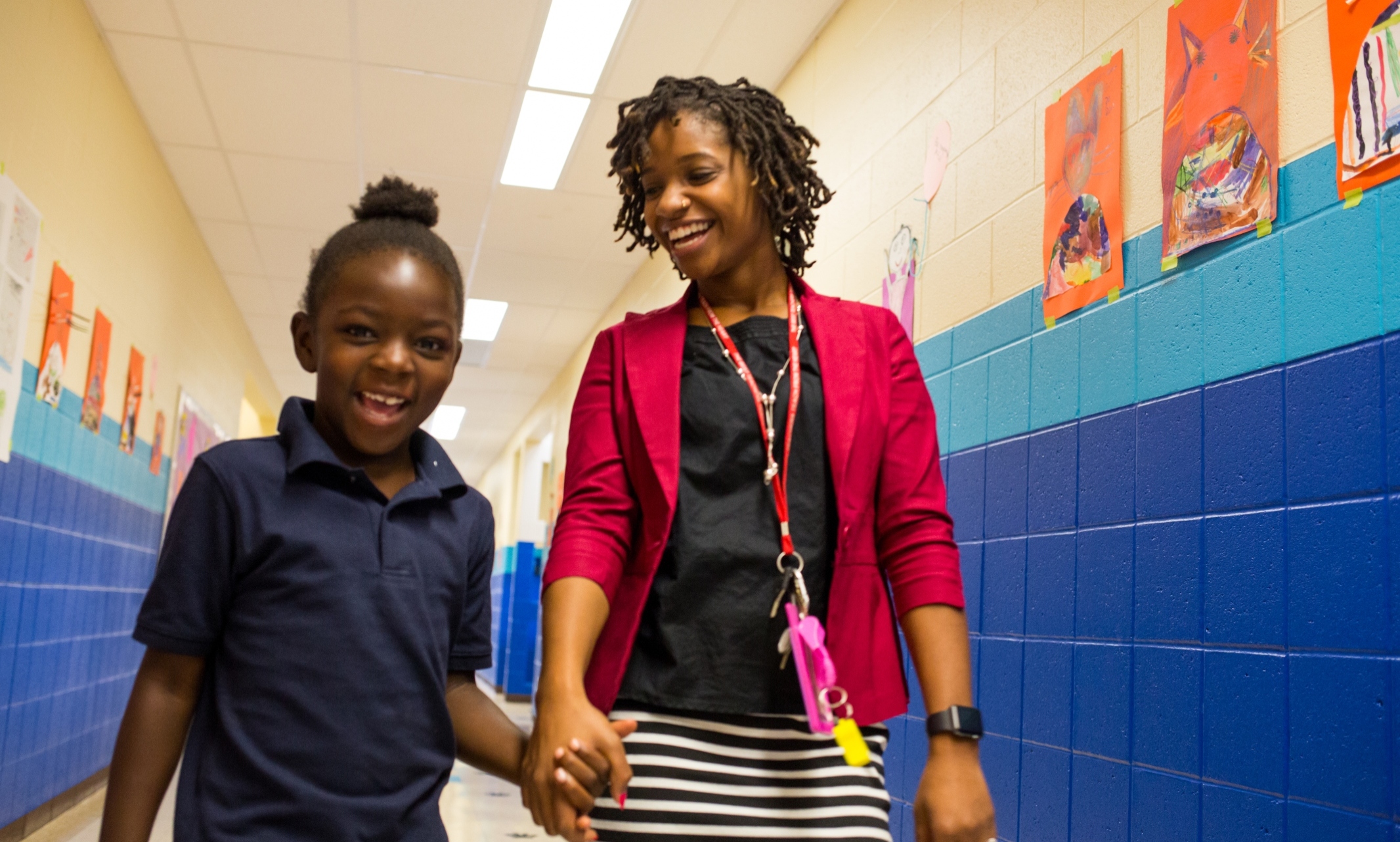
Foundation support accelerates Institute for Urban Education growth, progress
Despite the challenges of the last year, the University of Missouri-Kansas City Institute for Urban Education (IUE) in the School of Education is successfully affecting student success and teacher retention through its programming in urban schools, thanks in part to significant and steady support from major donors.
“We have very high expectations and high levels of support for our students,” Jennifer Waddell, Ph. D., director, Institute for Urban Education and Sprint Foundation Endowed Professor in Urban Education says. “Major gifts from the Sherman Family Foundation and the Sunderland Foundation – who also have high expectations in a very positive way – demonstrate their belief in the program, which is very reaffirming.”
The Sherman Family Foundation has been a longtime, consistent supporter and advocate of IUE. While there are many organizations that work toward advancing education and bolstering opportunity in underserved communities, Joseph Allen, a director at the foundation, says the IUE meets all the criteria for the Sherman Family Foundation board.
“These two donors’ gifts are important because when the boards of the Sherman Family Foundation and the Sunderland Foundation invest in us, it demonstrates a belief in us and the work we are doing.” — Jennifer Waddell
“We have three career educators on our board,” he says. “We know how important classroom teachers are. We are aware of how difficult it is to close the gaps in academic markers and graduation rates for students in the urban core. Hope is often the backbone of philanthropy. The Sherman Foundation board wants to invest in programs that have a certain degree of promise in addition to hope. We want to see that the proposed solution can move the needle.”
Allen says Waddell was instrumental in the Sherman Foundation board making their commitment for support.
“One thing we knew for sure was that IUE had a strong, dedicated leader in Jennifer.”
In addition to program leadership, the long-term research component of the IUE program has been critical to the Sherman Foundation support.
“Sometimes we say ‘no’ to people who do great work,” he says. With each opportunity we ask ourselves, ‘Does the organization or project deliver solid preliminary or proven results?’ We like to be able to see data that supports the programming. The IUE research reflects the program’s success.”
This success was due in part to the newly minted “Grow Your Own” program, which awards scholarships to high school students in urban areas who are interested in returning to teach in their alma maters. For Fall 2021, IUE awarded 42 new scholarships, despite dramatic national declines in teacher preparation over the last ten years, which were accelerated by the COVID-19 pandemic.
In total, more than 60 aspiring teachers will be part of the IUE in 2021-2022, the largest enrollment in the program’s history.
“When we talk to the young people in our ‘Grow Your Own’ program they say they want to be teachers because they want to make a difference,” Waddell says. “Our enrollment is almost double what we thought it would be. We are thrilled to have the Sherman Foundation and the Sunderland Foundation as partners in this success.”
The Sunderland Foundation is a significant UMKC funder, donating more than $15 million for building improvements in the last couple of years. But a change in their guidelines – funding had been restricted to capital expenses - allowed the foundation to support UMKC in different ways.
“Working with IUE gives us the opportunity to support needed scholarships for students from the urban core, who will return to the urban core to teach.” — Kent Sunderland
“Our main mission is still construction,” Kent Sunderland, president of the Sunderland Foundation, says. “But as the makeup of our board of directors shifted – six of the nine board members are now millennials – we began looking for ways to make a bigger impact with social justice initiatives.”
As Sunderland was looking for opportunities to meet the community’s needs, he contacted Leo Morton, former UMKC Chancellor, and Jerry Reece, UMKC Trustee.
“Jerry and Leo are committed to the success of the IUE initiative and outlined the value of the program,” Sunderland says. “Working with the IUE gives us the opportunity to support needed scholarships for students from the urban core, who will return to the urban core to teach. In addition, we were encouraged by the research that supports the program – that students of color in urban schools perform better with teachers of color who understand their environment.”
“These two donors’ gifts are important because when the boards of the Sherman Family Foundation and the Sunderland Foundation invest in us, it demonstrates a belief in us and the work we are doing,” Waddell says. “With these gifts, we hear them ask, ’How can we help make this happen because we believe in your program?’”
Waddell notes that while national enrollment in teacher preparation is down dramatically – and has been declining over the last ten years – the IUE has met their enrollment goals for the year.
“The 2021 class will be the largest in our history,” Waddell says.
“If these graduates stay in their positions, that’s success.” Allen says. “Waddell’s teachers are well-prepared and do stay – 90% of the IUE’s graduates are still in the classroom.”
Carolyn Barber, interim dean, Ewing Marion Kauffman Foundation/Missouri Endowed Faculty Chair and professor, recognizes the significance of the Sherman Family Foundation and the Sunderland Foundation gifts.
“We are excited and honored by both the financial support and philosophical conviction of the Sherman Family Foundation and the Sunderland Foundation,” Barber says. “Both organizations are pillars of Kansas City’s philanthropic community. Having them in our corner is more than a financial win, it reinforces the credibility of the program and allows us to exponentially expand student opportunity.”
Aug 02, 2021











